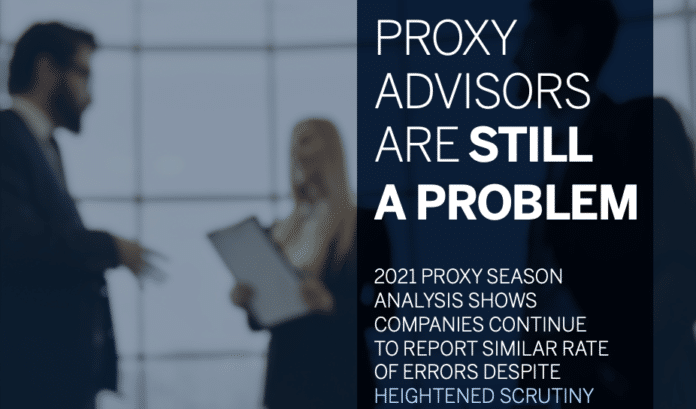
Despite continued evidence of proxy advisor errors and serious disputes with companies, the SEC proposed gutting a rule developed to improve the engagement between companies and proxy advisors
WASHINGTON, DC – The role and influence of proxy advisory firms is yet again under a microscope as the Securities and Exchange Commission (SEC) considers amendments that remove key provisions of its 2020 rule. As a key justification for the move, one Commissioner stated that the “’error rate’ with respect to proxy voting advice is vanishing to none.”
However, a new report from the American Council for Capital Formation (ACCF) found at least 50 instances where proxy advisors have formulated recommendations based on data or analysis disputed by the companies themselves in the 2021 proxy season, an increase from the 42 filings uncovered in 2020, suggesting that the SEC’s current actions are not warranted.
In response to these findings, Kyle Isakower, Senior Vice President of Regulatory & Energy Policy of the American Council for Capital Formation, commented: “The findings of today’s report further confirm that the SEC’s 2020 rule should still be enforced despite current claims that significant provisions of the rule need to be rolled back and are unwarranted. Significantly, this report is one of the few new pieces of data for the SEC to examine as they propose removing requirements that would have improved the process for companies to voice concerns with recommendations and for investors to review these claims.”
The continued prevalence of supplemental filings each proxy season demonstrates that errors and serious disagreements remain an issue, with the potential to harm the integrity of the proxy process.
The report notes that supplemental filings may well represent the “tip of the iceberg” and still undercount the overall instances of errors or other methodological flaws contained in proxy advisory firm recommendations. To submit such a filing, companies must voluntarily increase their own legal risk and divert significant resources, often with limited impact on shareholder voting since many investors “robo-vote” in line with proxy advisor recommendations shortly after they are released.
To make matters worse, many companies who submitted supplemental filings are mid-cap entities that do not have the significant legal and compliance resources of their larger counterparts and are least able to easily engage with proxy advisors or communicate with their shareholders.
The 2020 rule addressed this issue by requiring proxy advisors to share their recommendations simultaneously with companies and their clients, as well as alert their clients of instances where companies believe there is an error or have a serious disagreement with a recommendation. The SEC simultaneously released guidance to investors urging them to make use of the new information that would be made available to them to encourage investor review of contested matters.
Overall, these findings are consistent with past analysis. Explored initially in 2018 and again in the 2020, the new report highlights ACCF’s latest review of companies’ supplemental filings to their proxy materials to the SEC during most of the 2021 proxy season.
Furthermore, the SEC’s most recent actions come after years of meticulous consultation and months before the updates to the 2019 guidance and 2020 regulations intended to curtail proxy advisory firms’ influence over shareholder voting were initially set to take effect in December 2021.
Download the Full Report: Proxy Advisors Are Still a Problem: 2021 Proxy Season Analysis Shows Companies Continue To Report Similar Rate Of Errors Despite Heightened Scrutiny
The American Council for Capital Formation is a nonprofit, nonpartisan economic policy organization dedicated to the advocacy of an improved regulatory process, innovation in energy policy, dynamic free trade, an efficient infrastructure policy, a modern corporate governance process, pro-growth tax policy and a robust retirement system.
###






